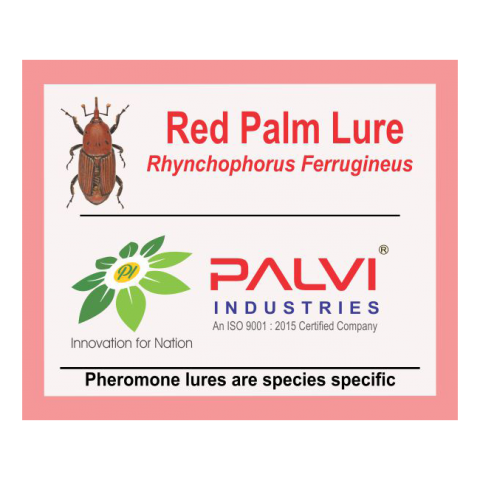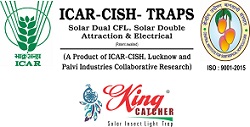Red palm weevil
RHYNCHOPHORUS FERRUGINEUS :
HOST CROP
Coconut palm, Date palm, Oil Palm & Arecanut palm
DESCRIPTION
The palm weevil Rhynchophorus ferrugineus is one of two species of snout beetle known as the red palm weevil, Asian palm weevil or sago palm weevil. The adult beetles are relatively large, ranging between two and four ceoiu8ntimeters long, and are usually a rusty red colour—but many colour variants exist and have often been classified as different species (e.g., Rhynchophorus vulneratus). Weevil larvae can excavate holes in the trunk of a palm trees up to a metre long, thereby weakening and eventually killing the host plant. As a result, the weevil is considered a major pest in palm plantations, including the coconut palm, date palm and oil palm.
LIFE CYCLE
The Red Palm Weevil, like other beetles, develops through complete metamorphosis,with larvae and pupae developing within the trunk and apical growth tissues of the palm meristem. Larvae are legless grubs with the body color uniformly pale yellow with a brown head. Larvae may attain lengths greater than 50 mm (2 inches). Larvae feed within the soft tissues of the meristem or leaf bases creating frass filled mines,enlarging and penetrating deep within the upper trunk areas as the larvae mature.Mature larvae construct a pupal chamber or cocoon made up of coarse palm fibers in which they pupate and occupy for approximately three to four weeks. The cocoons are located within the damaged tissue of the palm.
PEST IDENTIFICATION
Adult weevils are reddish brown, about 35 mm long and 10 mm wide and are characterized by a long curved rostrum (snout). Dark spots are visible on the upper side of the middle part of the body. The head and rostrum comprise about one-third of the total length. In the male, the dorsal apical half of the snout is covered by a patch of short brownish hairs, the snout is bare in the female, more slender, curved and a little longer than the male.
DAMAGES
Red Palm Weevil is widely considered to be the most damaging insect pest of palms in the world. In young plantations crown, trunk and bole are the natural sites of damage.In older plantations only crowns are infested. Many a time the insect completes several generations inside the crown or trunk feeding on the inner tissues until the trunk or crown becomes hollow and tree gets killed. After the death of the palm adult weevils come out and seek fresh trees to attack. The legless larvae are yellowish, stout and make galleries inside the tree for about 2-4 months. The adult weevils live for 3-4 months. The females are known to be attracted strongly to the fermenting sap oozing out of wounds in the trunk or the leaf bases.
TECHNOLOGY
Insect Sex Pheromone Technology: It is the process of attraction, and trapping the insect those damages to crops.
PER ACRE USE
Bucket trap with RPW Lure minimum 3-4/acre for controlling.
PRECAUTION
Please use hand gloves /keep clean hand for handling lure
BENIFITS
• Economically Affordable, easy to install and manage.
• If used properly can detect low numbers of insects
• Collect only Species Specific
• Non toxic
• Can be used all season long
• Pheromone Lure is species-specific
• Reduce the use of harmful pesticide and do organic farming and save the life
PURE
Pheromone used 99% pure.
PRODUCT
100% Effective from other commercial product
WEATHER
Lure working Depend on weather conditions.
LIFE
Lure working day in field life 90-120 days
DISPENSER
silicon rubber Septa
DURABLE
Lure can stay for one year without removing from packing.



